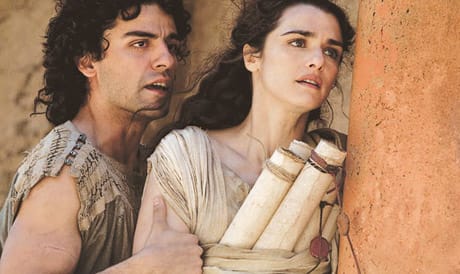In 391 A.D., people still believed that the Earth was not only flat but that it was also the centre of the universe and that the sun, along with the other wanderers, known to the Pagan Greeks of the time as the other planets, revolved around the Earth. How could one not have an ego with beliefs like these? It has been over 1,600 years since and it's strange to see that Agora director Alejandro Amenabar has a bit of that same ego driving his filmmaking.
Generally considered to be the first female authority on mathematics and astronomy, Greek philosopher Hypatia (played by a bold but overly confident Rachel Weisz) has always tried to teach her pupils that all humans are brothers — that between three people, if two of them are of the same mind, then so is the third, as this is what bonds them as brothers. Increasing shifts in religious beliefs shatter her faith, as she's forced to watch the quickly growing Christianity movement crush her Paganism and move on past that to Judaism in Egypt, one of the last thriving places in the Roman Empire. The story is huge in scope and vision but it's dragged down by focusing on the petty problems of the people and the often poor acting performances.
One automatically sees the correlation between religion being a serious driving force in keeping man divided, often violently, both then and now. Amenabar tells his story with such grandiose gusto though that it seems his ego is just too big to see that his point is monumental only to himself and not only obvious to the rest of us but wearing thin as well.
(E1)Generally considered to be the first female authority on mathematics and astronomy, Greek philosopher Hypatia (played by a bold but overly confident Rachel Weisz) has always tried to teach her pupils that all humans are brothers — that between three people, if two of them are of the same mind, then so is the third, as this is what bonds them as brothers. Increasing shifts in religious beliefs shatter her faith, as she's forced to watch the quickly growing Christianity movement crush her Paganism and move on past that to Judaism in Egypt, one of the last thriving places in the Roman Empire. The story is huge in scope and vision but it's dragged down by focusing on the petty problems of the people and the often poor acting performances.
One automatically sees the correlation between religion being a serious driving force in keeping man divided, often violently, both then and now. Amenabar tells his story with such grandiose gusto though that it seems his ego is just too big to see that his point is monumental only to himself and not only obvious to the rest of us but wearing thin as well.
